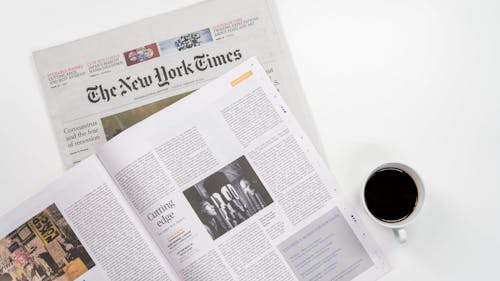JACKSON: Please stay informed on current events
Column: Writer's Block

I know our lives are busy and stressful. For many of you, current events, political developments, genocide and environmental catastrophes may be entirely irrelevant to your academic pursuits. My studies are intertwined with politics and global events, so it is easier for me to maintain an awareness of current events.
This, I understand, is a luxury in some regards because I am able to discuss political issues as part of my classes, where I process and analyze these occurrences. Nevertheless, it is imperative for all of us to make an effort to be aware of what is going on around us.
Perhaps you are thinking that you have enough on your plate with classes, social life and family. It may seem like I am asking a lot of you and that the task is impossible. With this in mind, I will try to break down a few ways to integrate staying informed into your daily routines and offer what I see as the benefits of staying informed.
You may also be thinking that the news is always depressing. To be honest, a lot of the time, it is. But that does not mean we should not pay attention.
It is more dangerous for us to collectively stick our heads in the sand than it is to listen and think about what is happening in the world around us.
Maybe you are like me, and you do not really want to read lengthy news articles on your phone or computer. You may like to try a podcast! There are countless podcasts out there that offer recaps of political developments and world events.
Many of us listen to music throughout the day while we are walking to class or getting ready in the mornings. Instead of my usual playlists, I make an effort to listen to a podcast.
NPR releases a podcast called "Up First" on Monday through Saturday that is usually only 10 to 15 minutes long and addresses three big events from the recent news.
BBC News offers a daily "Global News Podcast" that runs for approximately 30 minutes.
Al Jazeera has two podcasts: "News Updates," which is released three times a day with episodes less than 3 minutes long, and "The Take," which is released once a day and is approximately 20 minutes long.
The New York Times also offers a podcast called "The Daily" that dives into a singular relevant issue for approximately 30 minutes to an hour.
These are just a few of the countless podcasts available for streaming.
My warning to those who are willing to make this effort: Be cautious and skeptical Remember that no one is completely objective, and it is important to vary your sources.
Listening to only one outlet, no matter how objective it claims to be, is a recipe for disaster. We need to hear multiple perspectives. This is why I would also encourage you to speak with your friends and families about current events (sometimes).
I know that these conversations are not always productive, so if this is the case for you, prioritize your mental and emotional well-being. But, if you can find people with whom you can create a meaningful dialogue, it is beneficial to hear the perspectives of others on the same events.
We all have different lived experiences. It can be shocking how differently you and a friend may view a subject, and it is helpful to work through something complex together.
It can be easy to get lost in our own lives and forget that the world extends far beyond us. Listening to the news can put our lives into perspective and force us to look beyond ourselves.
Current events can mean many different things — domestic developments in the U.S., foreign policy updates or even administrative actions at Rutgers. If you are a citizen of the U.S., the government is acting in your name and supposedly in your interest. It sometimes fails to do this.
In order to hold these organizations accountable when this happens, we do actually need to pay attention. The same principle applies to Rutgers. When it treats its staff poorly and thinks it can get away with it, we have to care. These instances hopefully make it clear why paying attention is relevant to us.
I also would like to acknowledge that, for some people, this is not realistic to implement, and that is fine. It is impossible to be informed of all current events, all the time.
If you tried to be aware of all the events going on inside our country and across the globe, I would be seriously concerned for you. I think the best mindset to adopt here is that something is better than nothing.
Try to integrate paying attention into your routine. Do not beat yourself up about it — just do what you can.
Kate Jackson is a junior in the School of Arts and Sciences majoring in history and minoring in critical intelligence studies. Her column, "Writer's Block," runs on alternate Tuesdays.
*Columns, cartoons and letters do not necessarily reflect the views of the Targum Publishing Company or its staff.
YOUR VOICE | The Daily Targum welcomes submissions from all readers. Due to space limitations in our print newspaper, letters to the editor must not exceed 900 words. Guest columns and commentaries must be between 700 and 900 words. All authors must include their name, phone number, class year and college affiliation or department to be considered for publication. Please submit via email to oped@dailytargum.com by 4 p.m. to be considered for the following day's publication. Columns, cartoons and letters do not necessarily reflect the views of the Targum Publishing Company or its staff.



